What to eat after liposuction?
What are the best foods to eat after laser lipo?
What to eat after abdominal liposuction?
Table of Contents
Liposuction and bariatric surgery are transformative procedures that might help to improve your appearance, health, and confidence.
Liposuction is the most commonly performed aesthetic surgery worldwide. It is primarily used to correct deep and superficial fat accumulations and remodel the body contour. It has become an essential complementary technique to enhance the aesthetic results of many other procedures such as cervicoplasty, reduction or mastopexy, abdominoplasty, brachioplasty, thigh lift, and-bariatric surgery (skin removal)
However, achieving long-term success and optimal healing after surgery requires a commitment to proper nutrition, lifestyle changes, and effective post-surgery wound care. The transformation journey doesn’t end when you leave the operating room. What you eat after surgery is key to your recovery and long-term success.
The best diet plan after liposuction is crucial in your recovery and helps maintain your results.
This comprehensive guide will explain the essential aspects of a healthy diet after liposuction, ensuring you have all the information you need for a smooth recovery and long-lasting results.
A balanced diet rich in nutrients helps reduce swelling, speeds healing, and maintains your new body shape.
The Best Diet Plan After Liposuction
A healthy diet after liposuction is crucial for several reasons:
- Boosts energy: The right nutrients can help combat fatigue often experienced during recovery.
- Promotes healing: Proper nutrition provides the building blocks your body needs to repair tissues and reduce inflammation.
- Maintains results: A balanced diet helps prevent weight gain, which could compromise your liposuction results.
- Reduces complications: Certain foods can help minimize swelling and the risk of infection.
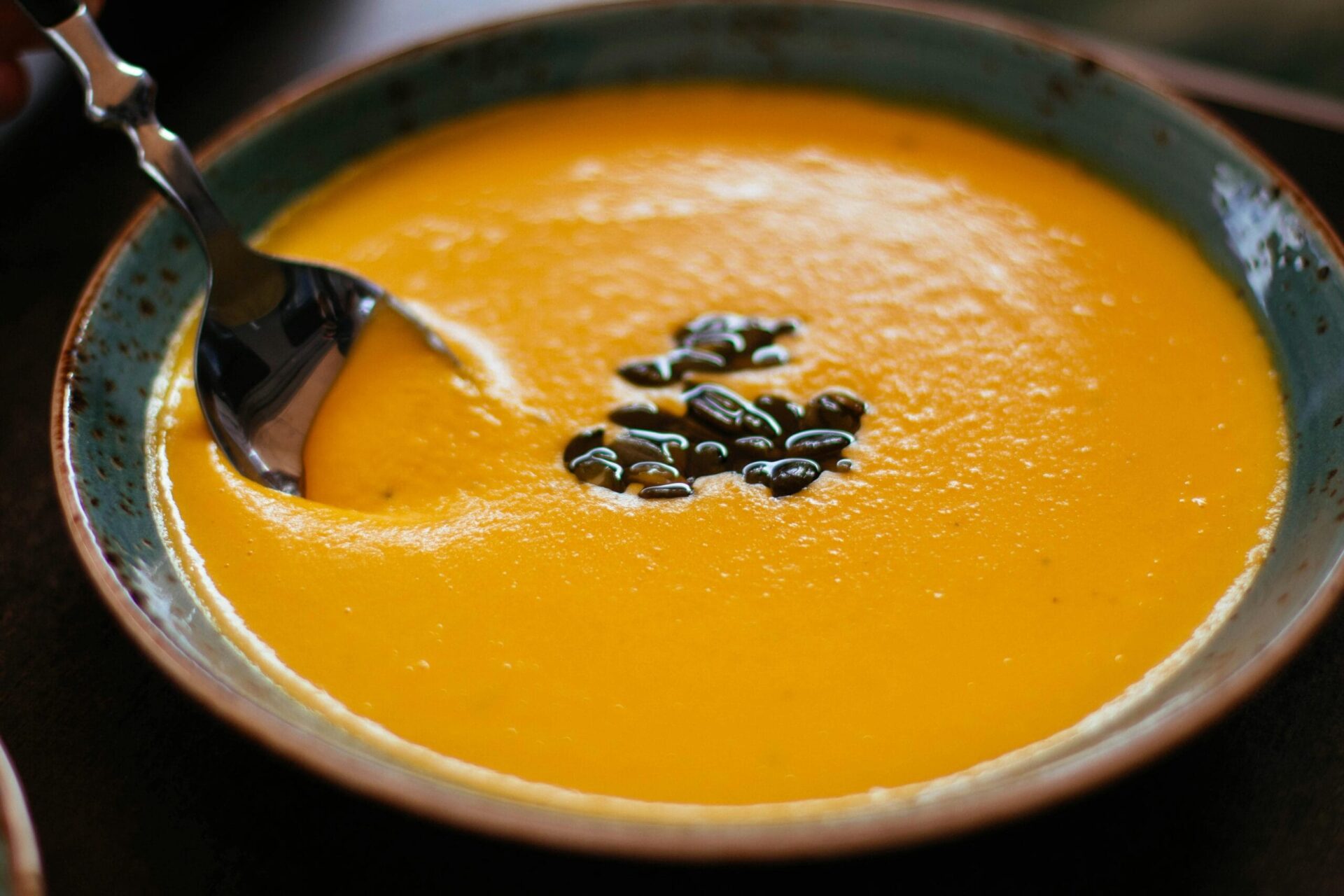
Some people wonder about following special diets like keto after liposuction. While a keto diet may work for some, it’s best to consult a nutritionist/dietitian before making major dietary changes post-surgery. The main goal is to eat nutritious foods that aid recovery and help maintain results.
Key Takeaways
- A nutrient-rich diet aids recovery and helps maintain liposuction results
- Lean proteins, fruits, vegetables, and whole grains support healing
- Consulting a nutritionist before starting any special post-surgery diet is recommended
As a Nutritionist and Registered Nurse with extensive experience in a plastic surgery clinic, I have worked alongside surgeons specializing in procedures like bariatric surgery, liposuction, abdominoplasty (tummy tucks for both men and women), gynecomastia correction, and facial plastic surgery. This diverse background has given me unique insights into patients’ challenges before and after surgery, the importance of proper preparation, and how setting realistic expectations is key to satisfaction and recovery.
When addressing the question, “Do you need to lose weight before liposuction?” the answer often depends on the surgeon’s preference. In my experience, some surgeons recommend patients lose at least 4-5 kg before undergoing procedures like abdominoplasty or liposuction to optimize results and minimize risks.
The Importance of Weight Loss Before Liposuction
- Surgeon Preferences:
- Some surgeons require weight loss to ensure better surgical outcomes, particularly for procedures like abdominoplasty, where a slimmer profile allows for more effective body contouring.
- Losing weight helps reduce visceral fat, which cannot be addressed by liposuction, and improves overall health markers, lowering surgical risks.
- Realistic Expectations:
- Liposuction is not a weight-loss solution; it’s a body-contouring procedure. Safely, only up to 3 kg of fat can be removed during liposuction.
- Patients should approach surgery understanding that changes in shape, not drastic changes on the scale, are the primary results.
Common Side Effects Observed in the Clinic
- Physical Side Effects:
- The most common postoperative complication is contour irregularities, with an incidence of 2.7%
- Post-Surgery Pain: Many patients experience moderate discomfort requiring pain management.
- Bruising and Swelling: These are common and can last several weeks.
- Wearing Compression Garments: Essential for reducing swelling and supporting the skin but often uncomfortable for patients.
- Small Fat Removal: Patients expecting significant weight loss can be disappointed when only a small volume of fat (up to 3 kg) is removed.
- Emotional and Psychological Side Effects:
- Disappointment Over Scale Results: Many patients are upset when they don’t see substantial weight loss despite paying significant amounts (e.g., £7,000) for surgery.
- High Expectations: Unrealistic goals can lead to dissatisfaction, particularly when no dietary or lifestyle changes follow surgery.
- Wound Healing Challenges:
- Liposuction: Rarely results in poor healing but still requires careful wound care to avoid complications.
- Abdominoplasty:
- Poor healing, infected wounds, and long scars are more common due to the extensive nature of the procedure.
- Post-Bariatric Plastic Surgery:
- Patients often face the most challenging healing due to pre-existing conditions like poor circulation, nutritional deficiencies, and large wound areas.
- Slow wound healing and infection are common in both private and NHS patients, requiring prolonged care and monitoring.
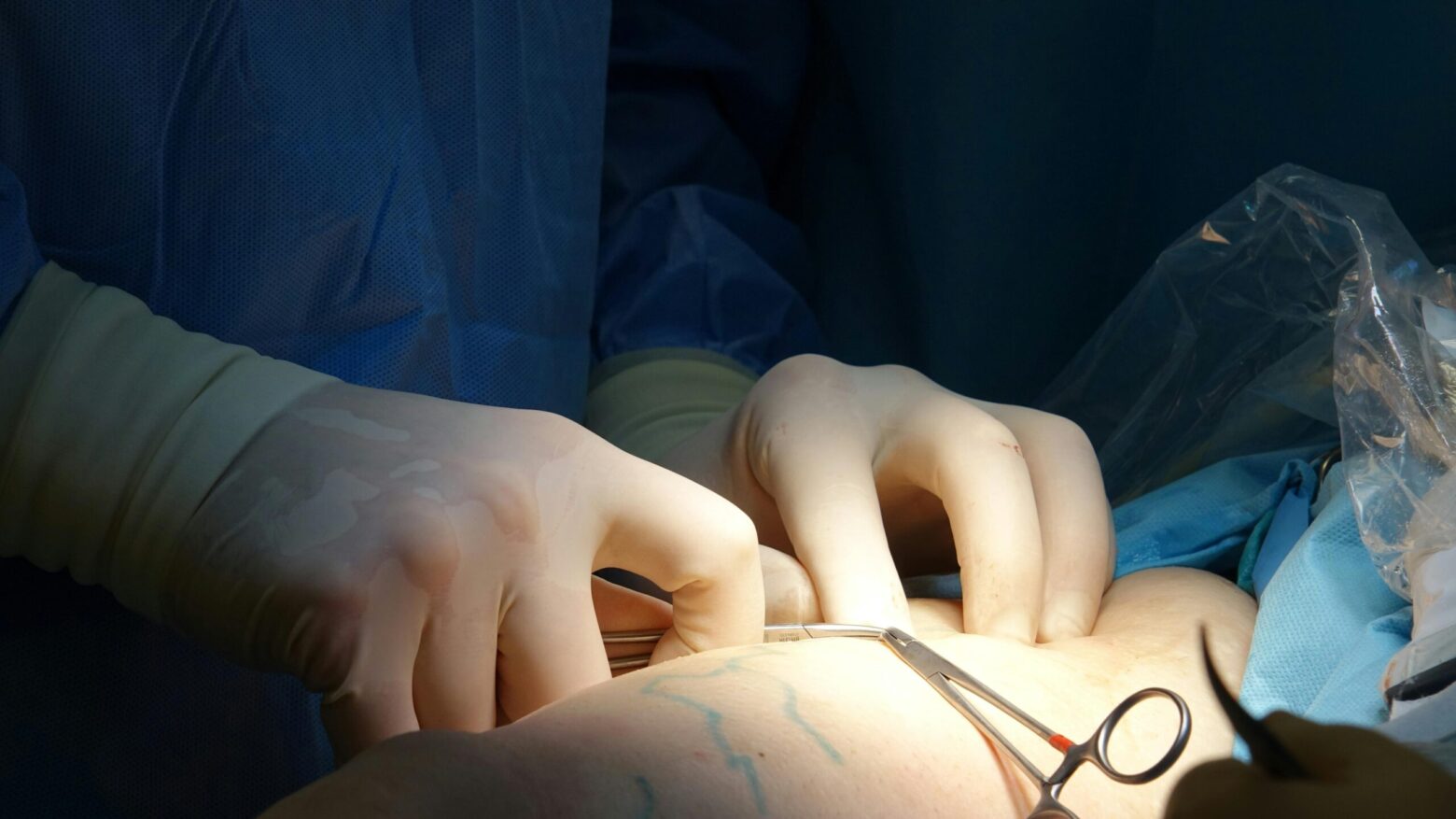
Avoiding Disappointment After Liposuction
- Set Realistic Expectations:
- Understand that liposuction is for reshaping, not weight loss.
- Discuss goals thoroughly with your surgeon to align your expectations with likely outcomes.
- Commit to Lifestyle Changes:
- Failing to adopt a healthy diet and exercise routine after surgery can lead to weight regain, frustrating many patients.
- Consider Pre-Surgery Weight Loss:
- Losing weight beforehand helps enhance results and reduces surgical risks.
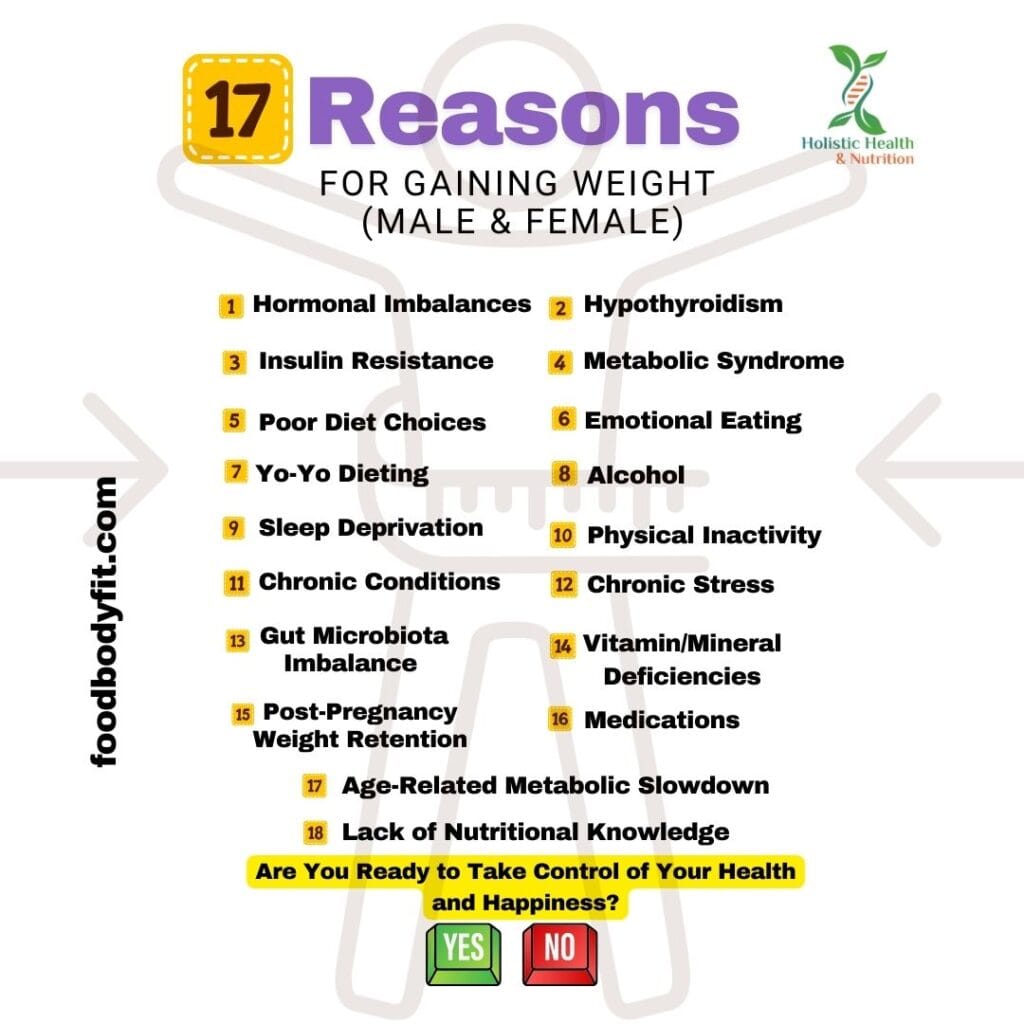
Understanding Liposuction and Recovery
Liposuction is a popular cosmetic procedure that removes fat from specific body areas. The recovery process involves several stages and requires careful attention to diet and activity.
What Is Liposuction?
Liposuction is a body contouring surgery that targets stubborn fat deposits. A plastic surgeon makes small incisions and uses a thin tube to suction out fat cells.
It now seems to have enormous potential for its application in ablative and reconstructive surgery, far from the most common aesthetic processes
Table 1. Summary of the main functional and therapeutic indications.
| Main indications of liposuction procedure | |
|---|---|
| Lipoma and Multiple lipomatosis | Muscocutaneous or fasciocutaneous flaps management |
| Lipedema and Lipodystrophy syndromes | Scar revision |
| Insulin-induced lipodystrophy | Genital area and Sexual dysfunction |
| Hiv-associated cervicodorsal lipodystrophy | Tracheostomy, Colostomy, and Urostomy management |
| Gynecomastia, Macromastia and Gigantomastia | Axillary hyperhidrosis |
| Postbariatric body contouring | Aesthetic body contouring |
Recovery time varies, but most people return to work within a week.
Stages of the Healing Process
The liposuction recovery process has several stages:
- Immediate post-op (1-3 days): Patients may feel sore and notice swelling.
- Early recovery (1-2 weeks): Bruising fades and swelling decreases.
- Mid recovery (3-4 weeks): Most daily activities can be resumed.
- Late recovery (1-3 months): Final results become visible as swelling continues to subside.
Caring for Your Body Post-Surgery
- Wound Care Basics
- Keep the surgical site clean and dry to prevent infections.
- Follow your surgeon’s instructions on dressing changes, and avoid soaking the area in water.
- Use prescribed antibiotics or ointments as recommended.
- Compression Garments
- After liposuction, wear compression garments as directed to reduce swelling, improve blood flow, and promote a smooth contour.
- Lymphatic Drainage Massage
- This gentle massage technique can help reduce swelling, prevent fluid accumulation, and speed up recovery.
- Monitor for Signs of Infection
- Watch for redness, warmth, fever, or unusual pain around the surgical area. Report these symptoms to your doctor immediately.
Proper care during these stages is crucial. Patients should wear compression garments, avoid strenuous activity, and follow their surgeon’s and nutritionist’ instructions carefully.
Diet after lipo and tummy tuck
Why Nutrition Matters After Surgery
Nutrition plays a crucial role in post-surgery recovery and weight loss.
After procedures like liposuction or bariatric surgery, your body requires specific nutrients to heal incisions, prevent infections, and maintain energy levels. Additionally, a well-balanced diet helps prevent post-surgery complications such as inflammation and poor wound healing.
Best food to eat after liposuction surgery (including supplements)
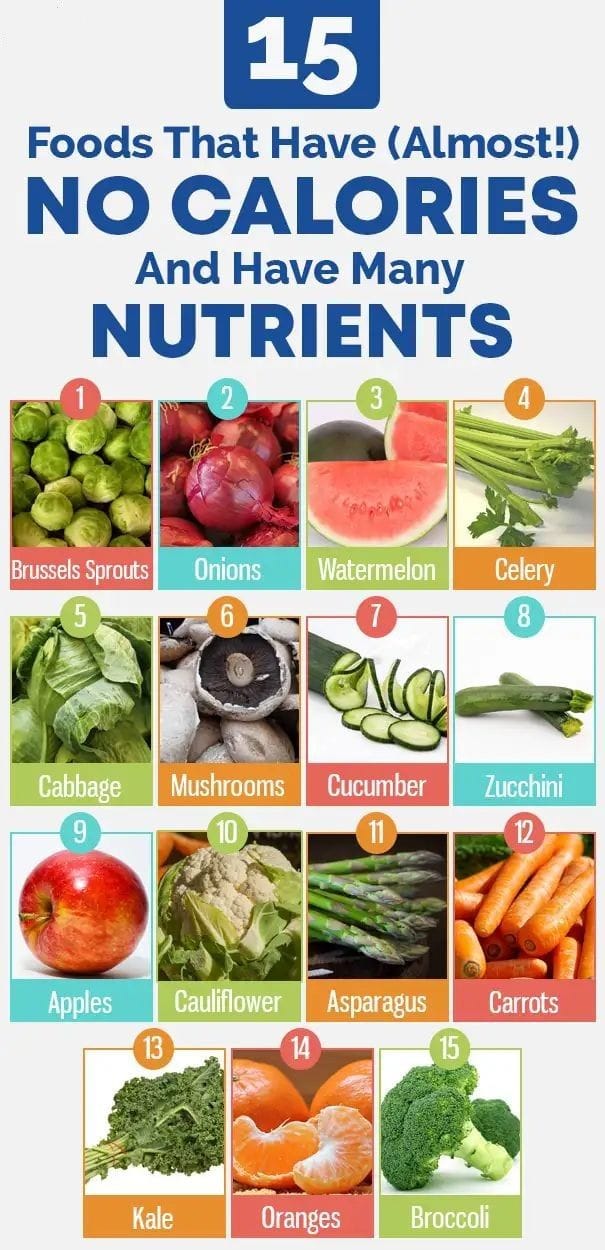
5 Essential Vitamins, Minerals, and Antioxidants for Post-Surgery Recovery
Post-surgery recovery requires proper nutrition to support wound healing, reduce inflammation, boost immunity, and promote overall recovery. Here is a carefully curated list of 5 critical vitamins, minerals, and antioxidants that can enhance post-surgical healing:
1. Vitamin C (Ascorbic Acid)
- Why It’s Important:
- Boosts collagen synthesis, essential for wound healing and tissue repair.
- Acts as a powerful antioxidant, protecting cells from oxidative stress.
- Enhances immune system function, reducing the risk of infection.
- Sources: Citrus fruits (oranges, lemons), strawberries, kiwi, bell peppers, and broccoli.
- Recommended Dose: 500–1,000 mg daily during recovery.
2. Zinc
- Why It’s Important:
- Plays a vital role in cell division and tissue repair, making it crucial for wound healing.
- Supports immune function to prevent post-surgical infections.
- A deficiency can slow healing and increase inflammation.
- Sources: Oysters, beef, pumpkin seeds, nuts, and fortified cereals.
- Recommended Dose: 15–30 mg daily, with medical supervision for higher doses.
3. Vitamin A
- Why It’s Important:
- Promotes epithelial (skin) cell growth and repair, which is critical for wound closure.
- Enhances immune response, reducing the risk of complications like infection.
- Supports collagen production, aiding in tissue repair.
- Sources: Sweet potatoes, carrots, spinach, liver, and fortified dairy products.
- Recommended Dose: 10,000 IU daily, under medical supervision.
4. Vitamin E
- Why It’s Important:
- A potent antioxidant that protects cells from oxidative damage during recovery.
- May reduce scarring by supporting skin repair and elasticity.
- Improves circulation, aiding nutrient delivery to healing tissues.
- Sources: Nuts (almonds, sunflower seeds), spinach, and avocado.
- Recommended Dose: 200–400 IU daily, with caution not to exceed the upper limit due to potential blood-thinning effects.
5. Selenium
Recommended Dose: 50–200 mcg daily.
Why It’s Important:
- An essential mineral and antioxidant that reduces oxidative stress and inflammation.
- Supports the immune system, helping to prevent infections in surgical wounds.
- Plays a role in tissue elasticity and repair.
Sources: Brazil nuts (an excellent source), fish, eggs, and whole grains.
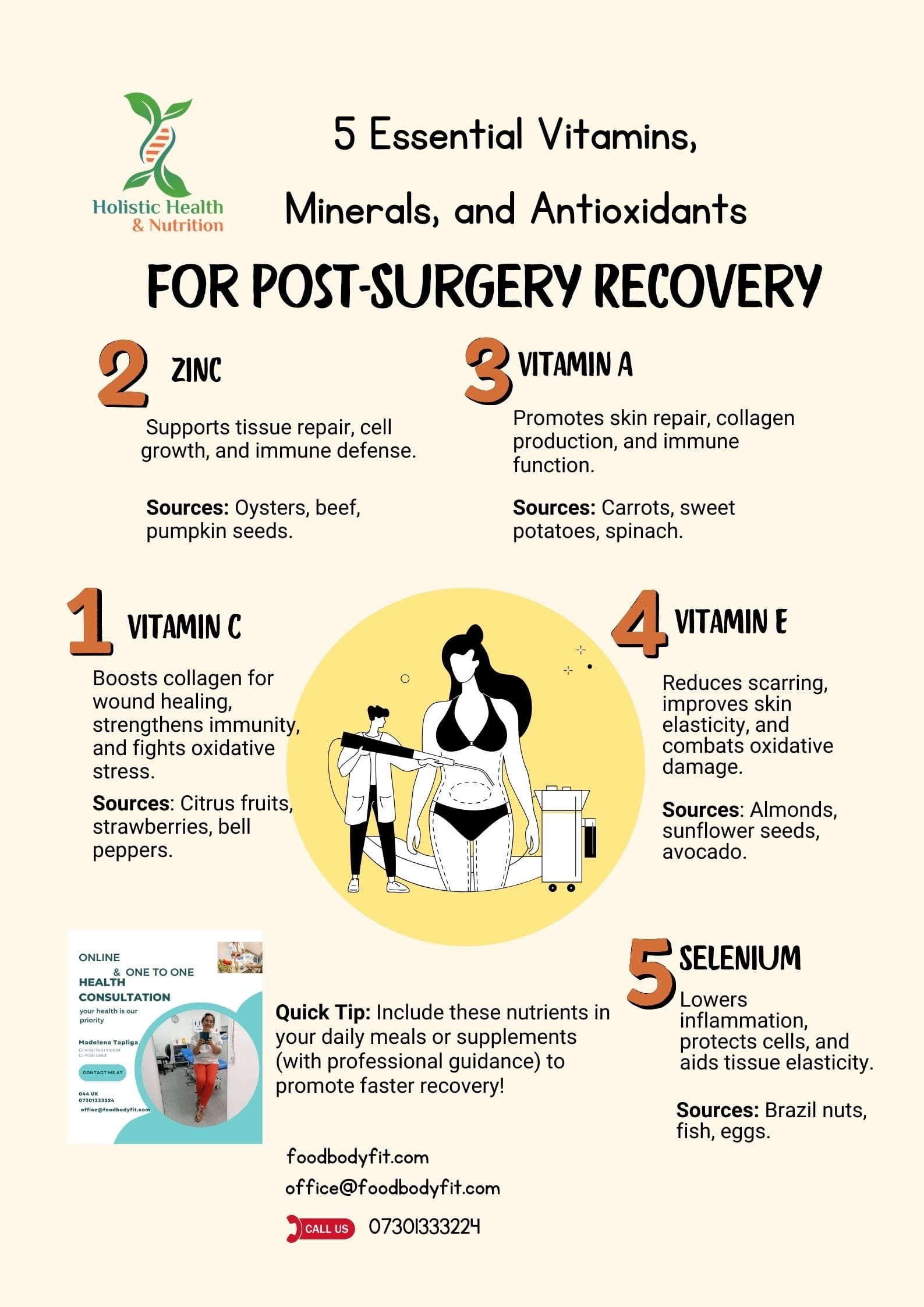
Key Nutritional Goals After Surgery
- Promote Healing: Foods rich in vitamins C, E, and zinc support wound healing.
- Reduce Inflammation: Anti-inflammatory foods like berries, leafy greens, and turmeric help minimize swelling.
- Support Weight Loss: High-protein, nutrient-dense meals promote fat loss while preserving lean muscle mass.
Post-Surgery Diet Recommendations
- Hydration
- A significant number of patients, and one of the main reasons for NHS admission, is dehydration. Drink at least 8-10 glasses of water daily to prevent dehydration, support digestion, and reduce fluid retention. Drinking plenty of water helps flush out toxins.
- High-Protein Meals
- Incorporate lean proteins like chicken, fish, tofu, and legumes. Aim for 1.2 to 2 grams of protein per kilogram of body weight daily to aid in tissue repair.
- Anti-Inflammatory Foods
- Include omega-3 fatty acids from salmon, walnuts, and flaxseeds. Add turmeric, ginger, nuciferine, medicinal mushrooms, green tea to reduce swelling and promote healing.
- Fiber-Rich Foods
- After bariatric surgery or liposuction, a diet high in fiber (mushrooms, whole grains, fruits, and vegetables) supports digestion and prevents constipation.
- Limit Salt and Sugar
- Avoid high-sodium and sugary foods, which can lead to water retention and weight gain.
A post-liposuction diet plan should focus on promoting healing, to reduce inflammation, maintaining energy, and avoiding foods that may cause bloating or water retention. Here’s a sample 7-day diet plan:
Sample Post-Surgery Meal Plan
Day 1-7 (Recovery Focused)
- Breakfast: Protein shake with unsweetened almond milk.
- Lunch: Broth-based soup with soft, pureed vegetables.
- Dinner: Mashed sweet potatoes and poached chicken breast.
Day 8-30 (Transition to Regular Diet)
- Breakfast: Scrambled eggs with avocado slices.
- Lunch: Grilled salmon with steamed broccoli.
- Dinner: Turkey meatballs with quinoa.
- Snacks: Fresh berries or a handful of nuts.
Healthy diet after liposuction
Good nutrition speeds up healing after liposuction. Eating the right foods helps reduce swelling and aids tissue repair. It also keeps your weight stable, which is crucial for long-term results.
A good diet also helps keep your immune system strong.
What to eat and drink after liposuction?
Eating after liposuction
- Lean proteins are important for healing after liposuction. Choose chicken, fish, tofu, or legumes. These help repair tissues and build strength.
- Fruits and vegetables provide vital nutrients. They’re rich in vitamins and antioxidants that aid recovery. Berries, leafy greens, and citrus fruits are great choices.
- Whole grains offer steady energy. They’re better than refined carbs for maintaining a healthy weight. Try oats, quinoa, or brown rice.
- Healthy fats from nuts, seeds, and avocados support healing. They help your body absorb vitamins and reduce inflammation.
Probiotics
Your plastic surgeon will prescribe antibiotics to protect against infection after your surgery, so make sure you will have plenty of probiotics in your diet (or take supplements) to counteract the effects of antibiotics on your gut bacteria. A list of foods to eat after liposuction that contain probiotics are
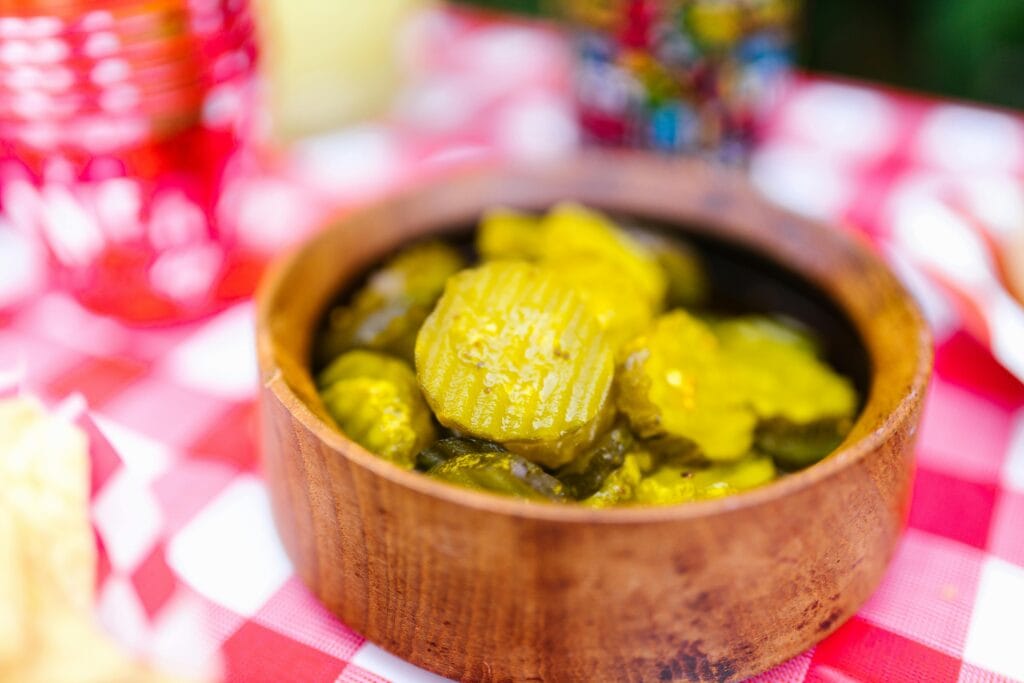
- Kefir
- Miso
- Kimchi
- Yogurt
- Tempeh
- Pickles
- Kombucha
Foods to reduce swelling after liposuction
Proper nutrition plays a key role in reducing inflammation and swelling after liposuction. Certain foods can help your body heal faster and minimize post-operative discomfort.
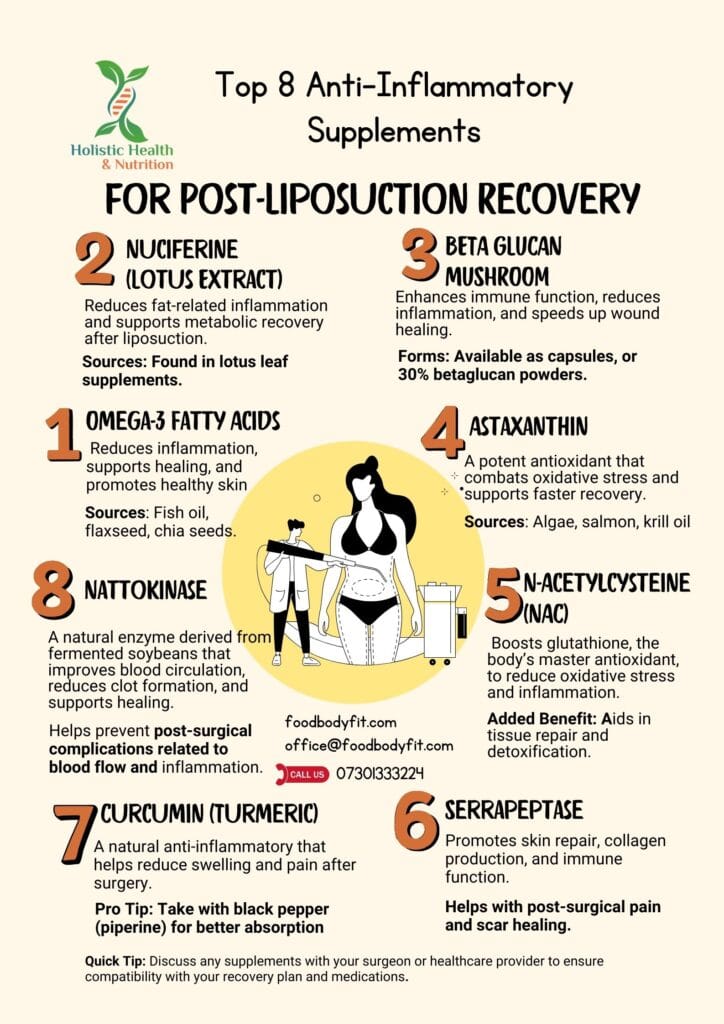
Medicinal Mushrooms
Benefits: Modulates immune responses and reduces chronic inflammation
Examples: Reishi, Maitake. Cordyceps Lion’s Mane.
Nuciferine (Lotus Extract)
- Benefits: Reduces fat-related inflammation and improves metabolic health.
- Found In: Lotus leaves
Anti-Inflammatory Foods
Eating anti-inflammatory foods is crucial for recovery after liposuction. Omega-3 fatty acids are especially beneficial.
Good sources include fatty fish like salmon, sardines, and mackerel.
For vegetarian options, try chia seeds, flaxseeds, and walnuts.
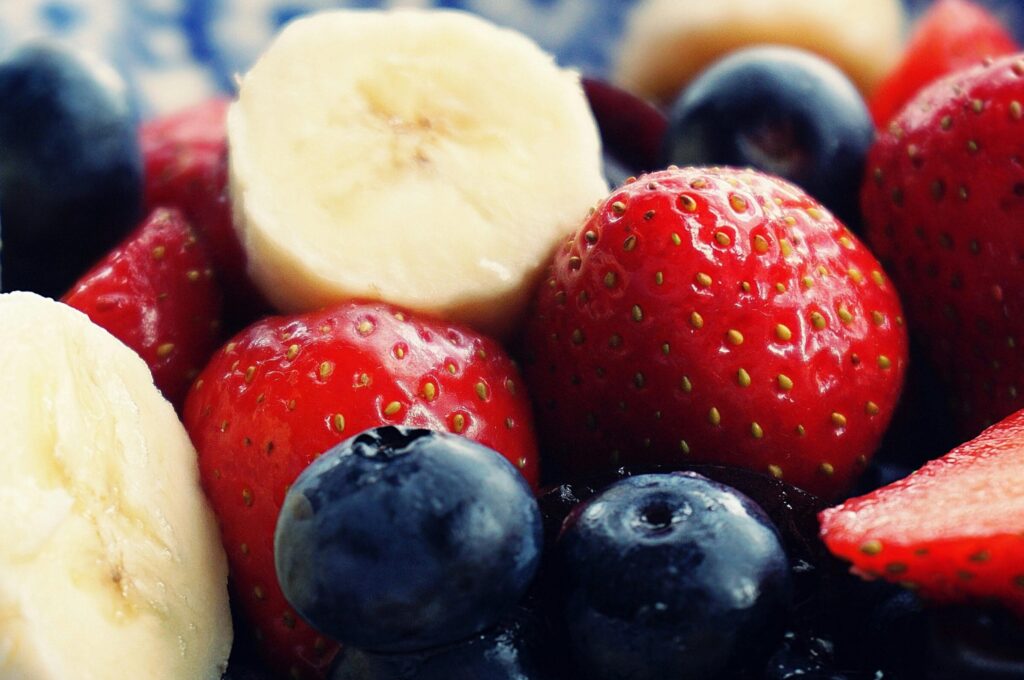
- Berries are packed with antioxidants that fight inflammation.
- Blueberries, strawberries, and raspberries are excellent choices.
Dark leafy greens like spinach and kale also provide anti-inflammatory benefits.
Other helpful foods include:
• Turmeric • Ginger • Green tea • Olive oil • Garlic
These ingredients can be easily incorporated into meals and smoothies to boost healing.
Foods high in vitamin C can also help reduce swelling. Good options include:
• Kiwi Citrus fruits • Bell peppers • Broccoli • Strawberries
Pineapple contains bromelain, an enzyme that may help decrease swelling and inflammation after surgery.
What Food to avoid after liposuction
Patients should avoid salty foods, as excess sodium can increase fluid retention and swelling. Processed foods, alcohol, and sugary drinks should also be limited during recovery.
These can slow down healing, increase swelling, and affect your results.
Identifying Processed and Sugary Foods
- Processed and sugary foods can harm your recovery after liposuction. Avoid sugary foods like: candy, cookies, and cakes. These can lead to weight gain and slow healing.
- Stay away from packaged snacks and frozen meals. They often contain unhealthy additives and preservatives, that will increase inflammation. Instead, choose whole foods like fruits and vegetables.
- Soda and sugary drinks are also off-limits. They’re high in empty calories and can cause bloating. Opt for water or unsweetened tea instead.
- Fried foods are another no-go. They’re high in saturated fat, which can increase inflammation. Choose baked or grilled options when possible.
Limitations on Alcohol and Sodium Intake
- Alcohol should be avoided after liposuction.vAlcohol contains calories, may jeopardize the results of liposuction. It can dehydrate you and slow down healing.
- High-sodium foods can increase swelling and raise blood pressure. Limit salt in your cooking and avoid salty snacks like chips and pretzels.
- Canned soups and sauces often contain high amounts of sodium. Read labels carefully and choose low-sodium options when possible.
- Fast food is typically high in both sodium and unhealthy fats. It’s best to prepare meals at home where you can control the ingredients.
By avoiding these foods and drinks, patients can support their recovery and maintain their liposuction results.
The Keto Diet After Liposuction: Is It Suitable?
The keto diet after liposuction is a topic of debate. While it can promote fat loss, it may not be ideal during recovery:
- It can be challenging to get all the necessary nutrients
- The high-fat content may interfere with healing
- It could lead to constipation. Do not forget about medication, that can cause constipation as well.
Always consult your nutritionist before starting any restrictive diet post-surgery.
Is it easy to lose weight?
The answer is No. It is not easy to lose weight.
Not only food influences the weight. This is a misconception, eat less, count calories and move more.
Majority of people do not eat 10.000 calories per meal. However, they eat the wrong food for them, therefore they struggle with chronic inflammation.

Join Our Post-Surgery Weight Loss Program
Are you ready to take control of your health and maximize your surgery results? Join our Post-Surgery Weight Management Program for expert guidance, personalized meal plans, and ongoing support to ensure lasting success.
📩 Sign up today for a free consultation with our team of experienced nutritionists and weight-loss specialists. Let us help you transform your life, one step at a time.
How to lose weight fast After Liposuction
Keeping weight off after liposuction takes effort. A mix of good food choices and regular exercise is key. This helps maintain results and avoid gaining back fat.
Maintaining a Healthy Diet
Eating well is crucial after liposuction. Focus on nutritious foods like fruits, veggies, and lean meats. These helps control weight and boost health.
Limit junk food, sugary drinks, and high-fat items. They can lead to weight gain and undo liposuction results. Opt for whole grains, which keep you full longer.
Include protein-rich foods in meals. They aid muscle repair and growth. Good choices are fish, chicken, and beans.
Small amounts of dark chocolate 80% cocoa can be okay. It has antioxidants that may help health. Probiotics found in yogurt support gut health.
Include Nuciferine in your daily diet. Nuciferine is the best fat burner for women – UK
Physical Activity and Weight Management
Exercise is vital for long-term success after liposuction. It burns calories and builds muscle, which helps keep weight stable.
Aim for at least 150 minutes of moderate exercise each week. This can include brisk walking, swimming, or cycling. Add strength training to build muscle and boost metabolism.
Regular activity helps get rid of stubborn fat that liposuction might have missed. It also improves overall health and mood.
Start slow if new to exercise. Gradually increase intensity and duration. This reduces injury risk and makes forming a habit easier.
Healthy lifestyle habits like good sleep and stress management also aid weight control. They help prevent comfort eating and keep hormones balanced.
Common Post-Surgery Challenges
- Weight Regain
- After liposuction, hormonal changes, such as a drop in leptin, can increase appetite. Focus on portion control and avoid processed foods to prevent regain.
- Bariatric surgery patients may experience weight regain if they revert to unhealthy eating habits.
- Healing Delays
- Poor nutrition, dehydration, or infection can slow wound healing. Ensure your diet includes essential nutrients like vitamin C, zinc, and protein.
- Emotional Eating
- Surgery can be emotionally taxing. Practice stress management techniques, such as mindfulness or therapy, to avoid emotional eating.
Frequently Asked Questions
Proper nutrition plays a key role in recovery after liposuction. Eating the right foods and drinks can speed healing and help maintain results. Let’s address some common questions about diet after this procedure.
What are the recommended foods to eat for breakfast post-liposuction?
A healthy breakfast after liposuction should include protein and fiber. Lean proteins like eggs or Greek yogurt are good choices. Whole grain toast or oatmeal provides fiber.
Fresh fruit adds vitamins and antioxidants. A smoothie made with berries, bananas, and spinach is also nutritious.
How does overeating impact recovery after liposuction?
Overeating can slow healing and affect results after liposuction. It may lead to weight gain, undoing the effects of the procedure.
Excess food intake can also cause bloating and discomfort. Patients should eat small, frequent meals to aid digestion and recovery.
Which foods should be avoided in the weeks following a lipo 360 procedure?
After Lipo 360, patients should avoid foods that can cause inflammation or bloating. Salty, processed foods should be skipped.
Sugary snacks and drinks are also best avoided. Fatty, greasy foods can be hard to digest and may slow healing.
What type of food to eat after liposuction?
Lean proteins (chicken, fish, tofu)
Fresh fruits and vegetables
Whole grain
mushrooms
nuts and seeds
antiinflammatory teas
Post-Liposuction Recovery Tip
Discuss any supplements with your surgeon or healthcare provider to ensure compatibility with your recovery plan and medications.

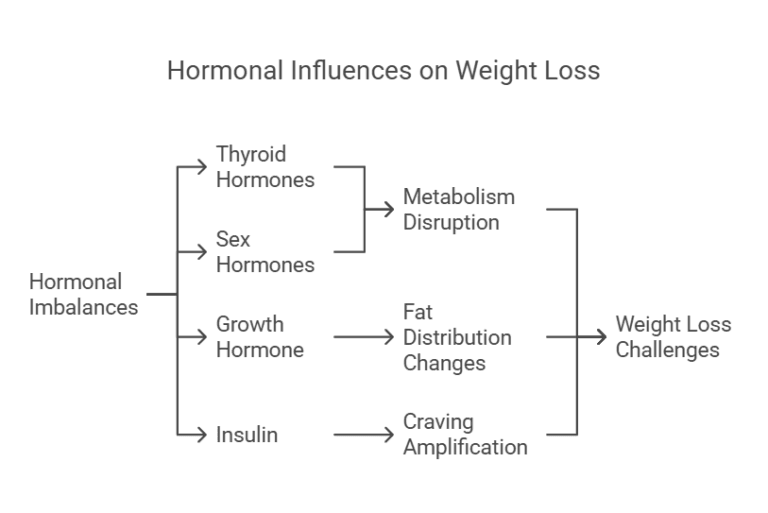
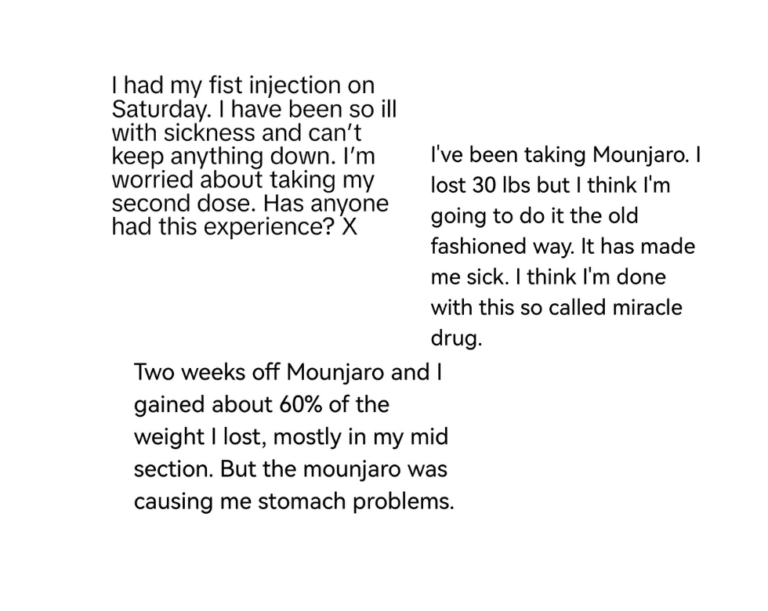
[…] The Best Diet Plan After Liposuction […]